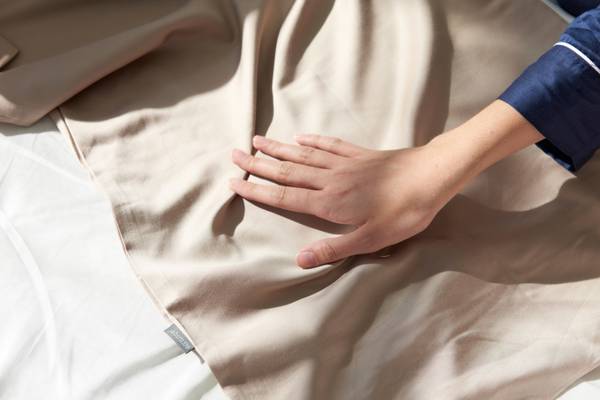
Can You Bleach Bamboo Sheets? How to Bleach Bamboo Sheets
Bleach is a touchy subject. It is a great cleanser for certain fabrics and it is not so great for others. It is hard to know when you should use bleach and when you should not. Then too many people think the harmful chemicals in bleach should be avoided making it tougher to get your clothes clean
Can you bleach bamboo sheets? It is possible to bleach bamboo sheets but it is not recommended. Chlorine bleach can ruin bamboo fibers as well as keep them from returning to their soft feel. It is recommended that if you are going to bleach bamboo sheets you should an oxygen version or vinegar and water.
To learn more about how to bleach bamboo and if it is safe to do so, just continue to read our article. The information it contains should help you care for your expensive bamboo sheets a lot better. Take a few minutes to get some new ideas about bamboo and bleach.
Can You Bleach Bamboo Sheets?

Anything is possible but if you are looking for very clean and damage-free results, it is best to skip chlorine bleach and use one of its safer alternatives. As you know chlorine bleach is filled with harsh chemicals that damage a lo to f fabrics like bamboo.
Also, you should not use fabric softeners, dryer balls, washer balls, dryer sheets, and similar products. These items can remove the softness of the bamboo, leave a film coating over your nice bamboo sheets or create pills.
If you have stains that a mild laundry soap can’t get out, then instead of reaching for the bleach bottle you should mix some vinegar and water and let the natural solution do the work.
Also, if you are going to wash your bamboo sheets do not use a harsh detergent as that soap can cause damage to nice bamboo sheets as well. A chlorine-free stain remover may work and be safe for your nice expensive sheets when they have stubborn stains on them.
What Happens if You Bleach Bamboo Sheets
The first thing that you may notice is that the softness in your bamboo sheets is gone. Bleach has a way of toughening up fabrics and bamboo is not immune to that influence. Keep in mind that we are talking about chlorine bleach for the most part.
Oxygen bleach is a safer alternative as the majority of harsh chemicals have been excluded from its formula. That means it should be safer for your bamboo sheets and not cause any problems for you. The next thing you may notice when you bleach your bamboo bedding is that the fibers were damaged.
This damage can be caused accidentally when you add too much bleach or too little water. it can happen when the bleach hits the fabric directly without being diluted by water first.
You also have to watch what other cleansers you use. If the stain remover, soap, or other products contain bleach you may be harming your bamboo bedding while cleaning them.
Bamboo may be a great fabric but it still has its vulnerabilities and you have to be careful when you launder this fabric.
How to Bleach Bamboo Sheets

The first thing you need to do is learn which type of bamboo bedding you have purchased. there are several varieties of bamboo sheets and each one should be laundered in different ways. Viscose bamboo is the easiest of the lot although it can’t take heat very well either.
When you wash this fabric you should not go warmer than cool water. Bamboo has a problem with heat and that makes it hard to dry in your dryer. as you wash forget the chlorine bleach and turn to either oxygen bleach or a homemade natural bleach like vinegar and water.
Add those two bleach alternatives to the bleach dispenser and let the machine add it in when it is the right time. If you have some tough stains to get out, it is best to presoak the bedding in cool water and using a non-bleach stain remover.
As you pull the bamboo sheets out of the washer you may feel that they are stiff, not so soft, and feel like canvas at times. That actually is a normal feel and the softness will come back without the aid of fabric softeners, etc.
How to Bleach Bamboo Blinds
Cleaning your bamboo blinds requires a delicate touch as harsh soaps and cleaners can ruin them. The best solution to use is a vinegar and water mixture that should get the dirt, mold, mildew, and other dirty issues off without too much trouble.
If the blinds are short enough you can place them in your bathtub in cool water to get them clean. Then if you spot any mold or mildew on the blinds, use one part bleach to 2 parts water and let the blinds soak for about 15 to 20 minutes.
Then wipe the blinds with a nice soft, clean cloth until all stains have been removed. Once you are finished, just hang the blinds in a safe spot that has a lot of airflow. It may take them several hours to dry so re-hanging them right away in their original spot is not advised.
Also, the key is to use a soap that is made to clean wood. Regular laundry detergents, hand and face soaps should not be used. Nor should dishwashing liquids or soaps be used.
Will Bleach Kill Bamboo Plants?

Believe it or not, you can’t kill bamboo plants by pouring bleach over the dirt holding these plants nor on the plant itself. If you try pouring bleach onto unwanted bamboo plants all you are doing is damaging the soil around those plants making it dangerous to try and grow other plants in the same soil.
Vinegar is not a good alternative and may only through the PH balance in the soil off. Roundup or glyphosate is also just as ineffective against bamboo plants. It may work on other plants but bamboo is a very tough grass to kill. This is not mentioning the toxic touch you will give to the soil.
You may have better luck using gasoline or diesel fuel but this is like pouring toxic waste onto your soil. Also, it is illegal to do so in many neighborhoods. Salt seems to be the most effective method but it takes a long time to do.
Instead of using these tricks, it is best and safest to just dig up the roots and get rid of them altogether.
Can You bleach a Bamboo Cutting Board?
You can bleach a bamboo cutting board and all you will need is about 1 tbsp of bleach in a gallon of water to sterilize the board and get the germs off. What you do not do is place the bamboo board in your dishwasher. This may be the easiest cleaning method but the heat is harmful to the bamboo.
Also, you really should not use bleach or other chemical-laden cleaning agents to clean off a board that is used to cut your food. That is just asking for health problems to arise.
Instead, you should use mild soap and water or salt and lemon juice. Or you can use some baking soda and a damp cloth to get the germs and dirt or food particles off. The salt option is the same process.
Sprinkle either salt or baking soda on the cutting board then use the clean damp cloth to wipe the dirt away. You can always add more salt or baking soda if the dirt remains. The lemon juice can be added on top of the salt without any risk to you or your cutting board.
Bleach on Bamboo Flooring

Before you leap into action and grab your floor cleaners to clean your bamboo floors, you should read all the labels and instructions that are on the cleaner’s packaging. Not all floor cleaners are made to fit every type of flooring you have in your home. use the ones that are made to clean bamboo without damaging it.
It is possible to use bleach as long as it is well diluted in water before you place it on your flooring. But be careful as too much bleach can cause damage to the hardwood and ruin its look or damage the fibers or weaken the material.
The key is to make sure you get the right ratio of bleach to water before you get started.
Some Final Words
bamboo is an attractive material to use no matter if it is for bedding, cutting boards, or flooring. It lends a nice air of sophistication to your home and helps keep germs and bacteria at bay.
The hard part about having bamboo items in your home is keeping them clean without using bleach. use an alternative as bleach is not always bamboo-friendly.

